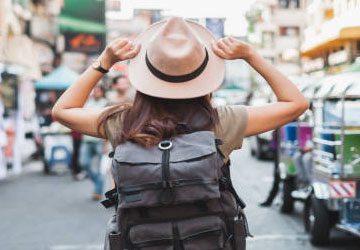The Ultimate Solo Travel Safety Guide
Before reading about these precautions, it's essential to understand that these measures aren't merely tips; they're lifelines that ensure your journey is more about thrill and less about potential hazards.
Every step we'll discuss has been curated considering the unique challenges faced by solo travelers. So, let’s unravel each one.
1. Research Your Destination Thoroughly
Diving headfirst into a new destination might sound romantic, but the charm quickly fades if you land yourself in an uncomfortable or unsafe situation. When you research your destination, you're not just looking at the top tourist spots.
Dive deep into forums, blogs, and travel advisories to understand the socio-political climate, common tourist scams, and neighborhoods to avoid. Familiarizing yourself with local customs and etiquettes can prevent inadvertent offenses.
The benefit?
You get to be a respectful traveler who can seamlessly fit in, reducing the risk of drawing unwanted attention.
2. Keep Emergency Contacts Handy
It's easy to assume you'd instinctively know what to do in emergencies, but in unfamiliar terrain and potential language barriers, panic can set in quickly.
Before setting off, compile a list of essential contacts: local police, the nearest embassy or consulate, medical facilities, and perhaps even local friends or acquaintances if you have any.
Regularly update your close ones about your whereabouts, ensuring they have a copy of your itinerary.
3. Invest in Travel Insurance
Many brush off travel insurance as an unnecessary expense until they find themselves in a predicament wishing they had it. When traveling solo, the stakes are higher.
An accident or illness in a foreign land can be daunting when you're alone. Travel insurance provides that safety net, covering unexpected medical expenses, trip cancellations, or lost belongings.
Ensure you read the fine print, understanding the scenarios you're covered for, and select a policy that best suits your travel needs.
4. Stay Connected But Cautious
Having a working phone is imperative. Whether it's for navigation, booking accommodations on the go, or simply reaching out in emergencies, staying connected can be your lifeline.
However, be cautious with public Wi-Fi networks. Cybersecurity threats are real. Consider investing in a VPN (Virtual Private Network) when accessing personal data on public networks.
5. Blend In, Don’t Stand Out
Drawing attention to yourself, especially in areas where tourists are a rarity, can make you a target.
Dressing appropriately as per local customs, not flaunting expensive gadgets, and being discreet with your actions can make all the difference.
Observing locals and emulating their behavior can provide valuable cues.
6. Always Trust Your Instincts
Your gut feeling is a powerful tool, honed over millennia of human evolution. If a situation or a place doesn't feel right, there's no harm in retracting your steps or choosing a different direction.
Solo travel often means relying on strangers, be it for directions, recommendations, or even companionship. While it's a beautiful way to connect with locals and fellow travelers, it's essential to be discerning.
If someone's behavior sets off alarm bells in your mind, it's always wise to distance yourself.
7. Secure Your Belongings
Solo travelers can sometimes be seen as easy targets for theft. Investing in good-quality locks for your luggage, using anti-theft bags, and not leaving your belongings unattended in public spaces can significantly reduce the risk.
Moreover, it's wise to split your money—keeping some in your main luggage and some on your person. Also, consider using a money belt or hidden pouches when in crowded areas.
Digital safety also falls under this category, so ensure your electronic devices are password-protected.
8. Avoid Risky Situations
While spontaneity is the essence of travel, solo travelers need to be a tad more cautious. Avoid walking in poorly lit or secluded areas during the night. If you're out partying, be mindful of your alcohol consumption.
Being inebriated not only makes you vulnerable but can also impair your judgment. If you’re relying on public transport, ensure you know the schedules to avoid being stranded.
9. Learn Basic Local Language
The ability to communicate, even if it's just basic greetings or asking for directions, can be immensely beneficial.
Not only does it help in navigating your way around, but locals also appreciate the effort, making them more amiable and willing to help.
Moreover, in sticky situations, knowing key phrases can make all the difference. Before your trip, make it a point to learn or note down essential words and sentences. There are numerous apps and pocketbooks available to assist with this.
10. Share Your Itinerary
It's essential to maintain a line of communication with someone you trust. Sharing your daily or weekly plans with a family member or a close friend provides an additional layer of security.
They'll know where you're supposed to be, which can be invaluable if something goes amiss. Regular check-ins, even if it's just a quick message or call, can give both you and your loved ones peace of mind.
Conclusion
Embarking on a solo expedition can be an unparalleled experience, filled with profound insights and transformative moments. But like any great adventure, it's not without its challenges.
Armed with these precautions, you can ensure that your journey remains enjoyable and safe. The world is vast, beautiful, and waiting for you. So, with prudence as your ally, go forth and traverse the myriad wonders our planet offers.
Happy travels!
